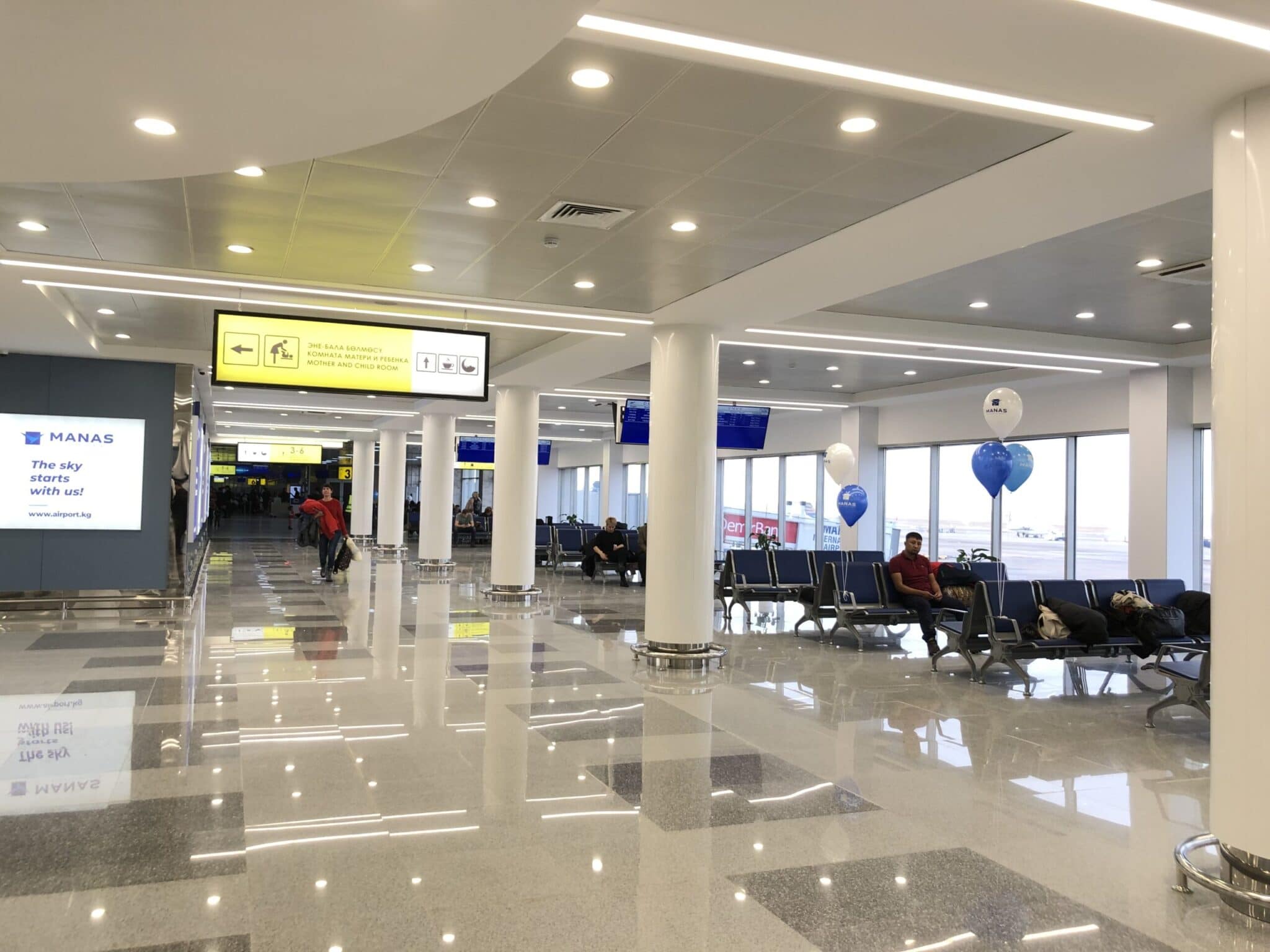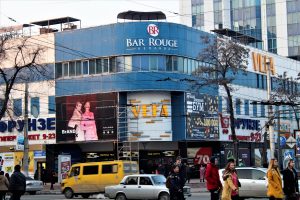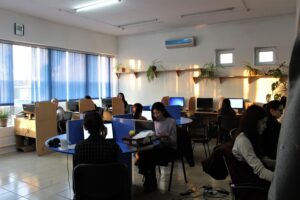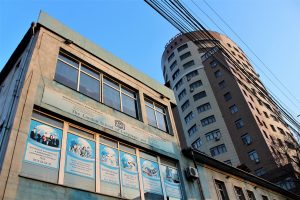Thinking of spending a semester in Bishkek, Kyrgyzstan? Let our students let you know what to expect when arriving to the city! Heading abroad is always a big step and can feel exciting or overwhelming – or both. Learn from the experience of others and hit the ground running!
How did you feel when you first arrived?
Mikaela Peters (Fall, 2019): To be honest, I didn’t really feel any sort of way. I felt focused on getting to my destination and getting settled. Actually, I did begin to feel a little homesick. After a few days, I was fine. But I have a little sister who was sad I was leaving. So sometimes, on the plane, I thought about that, and it made me sad. I enjoyed my airplane rides, nevertheless, because I think Turkish Airlines has good airline food, and because airplane rides are one of the only times I make time to watch movies, and I enjoy watching them. I was actually asleep for the majority of my airplane rides, which made the trip go quickly, but also made me mistakenly think I was “well rested,” which I would later find out wasn’t true. I had an aisle seat, so the concept of looking out the window was scrapped. Since I have become very good at sleeping on airplanes, I usually don’t wake up again until I feel the plane land. But I got off the airplane, saw the beautiful Kyrgyz mountains in the background, and felt like I was home again.
Camryn Vaughn (Fall, 2019): In the last minutes of my 42-hour journey from Montana, I was drifting in and out of sleep and aggressively squinting because the lights were turned on when we started descending. After deboarding the plane at 5:40 am, all the passengers squished onto a bus that took us to the main airport building. Per SRAS’s very clear and helpful instructions, I presented my passport, E-visa copy, and London School invitation letter to an unsmiling guard who gave me a stamp and didn’t even as much wave me forward.
I received an email the previous day from a London School coordinator in which contact information of the representative meeting me at the airport was shared. Sure enough, Syimyk was holding a very nice sign that displayed my full name and organizational affiliation. He wrangled my heavy bags despite my repeated offers to take one on myself and snapped a picture of my passport entry stamp to (I assume) confirm with someone in charge. He hailed a taxi for us and we were off.
I was nervous about arriving so early in the morning but stepping into the crisp and cool morning air while it was still becoming light was incredibly satisfying. Tall trees lined the highway but there were a few breaks through which you could see enormous mountains looming directly ahead.
Kathryn Watt (Spring, 2019): Jet lag is the bane of every traveler’s life. My overnight flight lost me 6 hours of sleep and by the time I arrived at my home-stay, my head was thumping and in a total muddle. This was not how I wanted to start a new semester, so I followed these hacks for jet lag:
- Take naps…but keep them short! Many people say the trick to getting over jetlag is to force yourself to stay awake so that you’ll be tired enough to sleep in the evening. However, if you don’t sleep at all you’ll spend your first few days in a sluggish state, struggling to unpack, buy essentials, or even hold a basic conversation. My advice is to take short naps, then get going!
- If you want to sleep: Do some stretching to ease off tense muscles, put lavender oil on your pillow and eat a banana. Bananas help to release melatonin and relax the body due high levels of potassium.
- If you need to wake up: Do some cardio exercise in the morning. This will release endorphins, waking you up for the day, and will tire your body to help you sleep better in the evening. Also try showering with a citrus shower gel and keep hydrated throughout the day.
How did things go at the airport?
Mikaela Peters (Fall, 2019): I had forgotten how simplistic the airport customs protocol was. Passport control looked nearly identical to what I had experienced at the border between Kyrgyzstan and Kazakhstan, which had been a more recent memory for me than that of Kyrgyzstan’s airport’s border control. Manas International Airport is one of those airports where you get bussed from your plane to the miniscule building that is the airport. There was only one luggage carousel, and with two flights coming in at the same time, many people stood there waiting. I was one of the last to claim my luggage. In fact, the carousel had stopped, and I had to walk all the way around to the other side to claim one bag and then the other. Fortunately, the London School representative who met me at the airport was able to help me with my bags. Syimik held a sign displaying my name, which helped a lot. I remember having a hard time finding my study abroad representative the first time I came to Kyrgyzstan. I would say everything went very smoothly.
Camryn Vaughn (Fall, 2019): Syimyk took me to my host family’s apartment complex where my host mom met us downstairs. He helped us take my luggage up to the right floor and chatted with my host mom about my scheduled orientation that day before taking off. My host mom and I shared a few cups of tea and bread, and I met my host dad as well. It was still fairly early, so we went back to sleep for a few hours. I took a shower and ate lunch with the family before I had to be at the London School at noon and my host mom walked over with me. I can see the school building from my apartment, I’m only a few blocks away, maybe a ten-minute walk.
How was the transfer to and arrival to the city?
Mikaela Peters (Fall, 2019): With this being my third time to Kyrgyzstan, my “first” impressions this time around served as a comparison between what I was now experiencing and my previous memories. Our taxi ride was silent, which I assume was okay with everyone considering it was 6 AM. I got settled okay and immediately showered and unpacked. Because I slept on all plane rides, I wasn’t expecting to be exhausted, but I kept falling asleep in the middle of the day every time I laid on my bed during my first two days in country. I discovered that I lived even further south than I had expected. I was nervous about how I would get into the city every day and how long that would take. Fortunately, my host dad drives into the city almost every day and I am able to hitch rides with him. But I do know how to use the marshrutka to get home. I wasn’t expecting to live on what was virtually a farm. But in any event, I had all of the amenities I needed. And I came to like having 16 sheep in my backyard, despite the fact that I wasn’t expecting it.
Camryn Vaughn (Fall, 2019): I checked out the gift bag that Syimyk gave me that morning, courtesy of the London School. Inside was a local phone (a Nokia!), cookies, a water bottle, and toilet paper. Kunduz was waiting for us in the London School lobby. I received my semester class schedule the day prior, so knew what to expect for class and break times. She showed me the school canteen, library and computer lab, as well as the outside of the dorms. We did a quick city tour as well, just down the street from the school is the Vefa center mall where one can add money to a local phone. We went to a currency exchange and a safe ATM near the school as well.
Kathryn Watt (Spring, 2019): After collecting my suitcase, I was greeted in the arrivals section by my course coordinator, holding a sign titled “London School.” We walked through the crowds of taxi drivers to where the shuttle was parked. It was about a half hour drive to get to my home-stay where I was given breakfast when I arrived – some soup, bread, and salad. Don’t be surprised if you’re given lunch/dinner food for breakfast! It’s common in most of this part of the world. After talking with my host mum and sister over a cup of tea, I went up to my room and took a nap. After waking up, I did some yoga, took a shower and immediately started unpacking. I highly recommend unpacking as soon as possible, as the SRAS schedule is very busy and you’ll have an easier time if you’re organized from day one. Your room will be equipped with a bed, chest of drawers, and a desk. You’ll also be provided with bed sheets and a towel.
How was your orientation?
Mikaela Peters (Fall, 2019): Orientation was interesting because I learned some things I didn’t know as well as I should, such as the importance of being “part” of your host family and trying your best to be home in time for dinner. In all honesty, these are things I have traditionally struggled with previously while living with host families. Therefore, I am glad I had someone spell this out for me so I can make an extra effort to be involved with my host family, especially since I am only living with them for a month. Afterwards, I will be in a dorm and can be out being as social as I want after class hours. I learned more about the grading structure of the classes, more about life in the dorms. I learned how to access the internet from another student. I had been given a mini tour around the immediate vicinity the first day I arrived. I have learned of local places to eat lunch from other students. We work directly with our program directly when it comes to any requests or concerns we may have with regards to our schedule.
Camryn Vaughn (Fall, 2019): We had orientation the Wednesday of our first week of class. It was mostly about cultural differences and what to expect from living with host families. Academic expectations were also explained, such as when our tests are assigned and what percentages of our final grades are based on, etc. The London School coordinators and manager did this section, and then SRAS student coordinator Molly Wise gave us a presentation about what’s going on in the city and shared resources with us for finding and using services.
Kathryn Watt (Spring, 2019): Later in the afternoon, my host sister gave me a tour of the local area, taking me to Vefa Center (the local shopping mall) and showing me some local cafes and restaurants. Frunze Supermarket in the Vefa Center is where you will probably do most of your grocery shopping; it is just a stone’s throw from the London School and stocked with all basic food, hygiene, home ware, and stationary products. For health food and specialist products, I recommend Ecoland, which is just across the road from London School.
On my first day, I also got a local SIM at O! (a phone shop immediately to the right of Vefa Center entrance) and bought the unlimited Internet package, which costs about $2 a week. You can top up by typing your number into one of the self-service machines around town and depositing cash, or via a link online – it usually takes about 10/15 minutes for the balance to come through. If you want to save some money, top up directly with the phone company you buy your SIM from (at their machines, in their store, or from their website), as you’ll be given a service charge otherwise (I learnt this the hard way!).
On my orientation, I received two presentations, one about my course, and the other about how to navigate life in Bishkek. The course presentation was very helpful as it gave me an insight into the layout of the program overall and allowed me to see where my marks would be allocated. However, the second presentation mostly covered information that I had already read on the SRAS website before I arrived. After the presentations, I was given a tour of the London School and shown around the city. Make sure you bring sensible shoes and a bottle of water to your orientation, as you will be walking for most of the city tour. You will be shown the main shopping centers, where you can buy food, get a local sim, and how to top up your phone. This part of the orientation is helpful if you are living in dorms, but for myself it wasn’t as useful as my host family had already shown me around the day before.
How was registration and starting classes?
Mikaela Peters (Fall, 2019): Classes started the following Monday after I arrived. I was pretested for my language abilities as soon as I got to class on Monday. Then I was grouped with appropriate teachers. I enjoy my classes a lot because they are exclusively in Russian, which makes them challenging. Also, my level is significantly higher this time around which makes it a lot easier for me to interact with my teachers and learn a lot from them.
Camryn Vaughn (Fall, 2019): We received our special class schedules a day after we arrived. The schedule is for each day for the entire semester, so I could see when our excursions and trips are planned as well. In the Central Asian studies program, students take intensive Russian, which is split into three class sections that are 80 minutes each Mondays, Tuesdays, and Thursdays: reading, grammar, and communication. Additionally, we take Understanding Central Asia and the New Great Game, both taught in English three afternoons out of the week.
Wednesdays we don’t have classes, but there are often lectures, cooking or crafting lessons, and peer tutoring scheduled. Fridays, we start later and only have one Russian class (communication) and then an end-of-the-week test we complete online. Typically, one lesson is completed each day in Russian classes and there are homework quizzes that correspond to the lessons that should be completed each night.
We all were given an online placement test that was taken a few weeks before we arrived in Bishkek. Based on my own experience and after talking to the other students, it was concluded that nobody did well on the exam because it was timed (10 minutes!) and the questions and answers were incredibly arbitrary. On our first day of classes, however, we did an oral exam that made a difference in our placement and many of us were actually moved up a level on the second day because the online placement test scores reflected our Russian abilities quite poorly.
Russian classes are one-on-one, which is a little nerve-wracking. I’m often put on the spot and the instruction is based online, so there isn’t much writing, which is how I’m accustomed to learning Russian from my university classes at home. It’s very conversational, which is obviously helpful because that’s where my Russian skills lack. .
But it’s a little uncomfortable because my brain is working so hard to do everything verbally without taking the time to copy new words down to refer back to when they come up again. I think it will take time getting used to, but luckily students have online access to the same lesson pages we use in class, so I’ve been looking ahead to identify unknown words and constructions to write down and familiarize myself with before class.
Kathryn Watt (Spring, 2019): London School will sort out your registration and visa extension. It’s a good idea to bring a set of passport photos (3×4) with you, as you will need to give these, along with your passport, to your coordinator within the first few days. If you don’t have photos with you, you’ll be taken to a photo booth during your orientation to get photos taken. Your coordinators will also photocopy your passport – you will need to keep this and your student card with you at all times in case you are stopped by the police and asked for ID.
Having gone through all this, how do you feel?
Mikaela Peters (Fall, 2019): I went through many feelings during my first weekend back in Bishkek. These feelings ranged from pure exhaustion, a bit of anxiety, isolation, focus, and, finally, feeling connected to others again. I would attribute the negative feelings I initially felt to exhaustion and the adjustment period I went through as I was figuring out the lay of the land with where I lived this time, as well as learning the personalities of my new host families, who were Russian, rather than Kyrgyz, like my previous host family. My first weekend in Kyrgyzstan was definitely an adjustment period, despite being a veteran traveler to Kyrgyzstan.
Camryn Vaughn (Fall, 2019): I’m very excited to dive in to this semester. This first week of being introduced to Kyrgyz culture has me looking forward to exploring more of the culture and being immersed in the language.
Kathryn Watt (Spring, 2019): As different as Bishkek is from the US and the UK, it is a city with a nice balance between the modern conveniences of the West and the warm hospitality of the East. You will probably feel very tired in your first couple of weeks, but this is natural. Just look after yourself, let SRAS and London School know if you need anything, and you’ll be settled in in no time!




